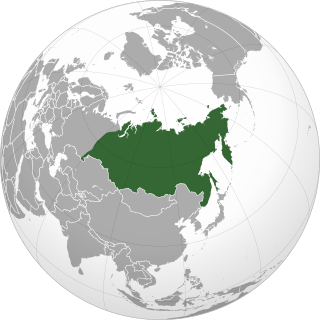
Siberia is an extensive geographical region comprising all of North Asia, from the Ural Mountains in the west to the Pacific Ocean in the east. It has formed part of the sovereign territory of Russia and its predecessor states since the centuries-long conquest of Siberia, which began with the fall of the Khanate of Sibir in the late 16th century and concluded with the annexation of Chukotka in 1778. Siberia is vast and sparsely populated, covering an area of over 13.1 million square kilometres (5,100,000 sq mi), but home to roughly a quarter of Russia's population. Novosibirsk, Krasnoyarsk, and Omsk are the largest cities in the area.

The Baikal–Amur Mainline is a 1,520 mm broad-gauge railway line in Russia. Traversing Eastern Siberia and the Russian Far East, the 4,324 km (2,687 mi)-long BAM runs about 610 to 770 km north of and parallel to the Trans-Siberian Railway.

Yakutsk is the capital city of Sakha, Russia, located about 450 km (280 mi) south of the Arctic Circle. Fueled by the mining industry, Yakutsk has become one of Russia's most rapidly growing regional cities, with a population of 355,443 at the 2021 Census.
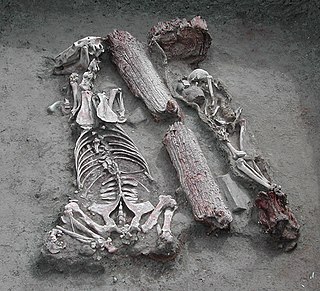
The Pazyrykburials are a number of Scythian (Saka) Iron Age tombs found in the Pazyryk Valley and the Ukok plateau in the Altai Mountains, Siberia, south of the modern city of Novosibirsk, Russia; the site is close to the borders with China, Kazakhstan and Mongolia.

Permafrost is soil or underwater sediment which continuously remains below 0 °C (32 °F) for two years or more: the oldest permafrost had been continuously frozen for around 700,000 years. While the shallowest permafrost has a vertical extent of below a meter (3 ft), the deepest is greater than 1,500 m (4,900 ft). Similarly, the area of individual permafrost zones may be limited to narrow mountain summits or extend across vast Arctic regions. The ground beneath glaciers and ice sheets is not usually defined as permafrost, so on land, permafrost is generally located beneath a so-called active layer of soil which freezes and thaws depending on the season.

Radio Free Europe/Radio Liberty (RFE/RL) is an American government-funded international media organization that broadcasts and reports news, information, and analyses to Eastern Europe, Central Asia, the Caucasus, and the Middle East, where it states that "the free flow of information is either banned by government authorities or not fully developed." RFE/RL is a private 501(c)(3) corporation and is supervised by the U.S. Agency for Global Media, an independent government agency overseeing all international broadcasting services that receive American government support. Jeremy Bransten is the organization's acting editor-in-chief.

The Kolyma is a river in northeastern Siberia, whose basin covers parts of the Sakha Republic, Chukotka Autonomous Okrug, and Magadan Oblast of Russia.
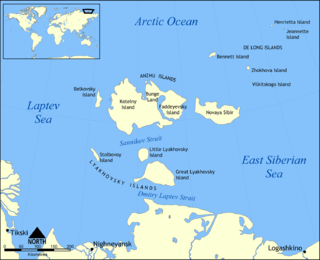
The New Siberian Islands are an archipelago in the Extreme North of Russia, to the north of the East Siberian coast between the Laptev Sea and the East Siberian Sea north of the Sakha (Yakutia) Republic, of which they are administratively a part.

The Yamal Peninsula is located in the Yamalo-Nenets Autonomous Okrug of northwest Siberia, Russia. It extends roughly 700 km (435 mi) and is bordered principally by the Kara Sea, Baydaratskaya Bay on the west, and by the Gulf of Ob on the east. At the northern end of this peninsula lie the Malygina Strait and, beyond it, Bely Island. Across the river lies the Gyda Peninsula. In the language of its indigenous inhabitants, the Nenets, "Yamal" means "End of the Land".

Siberian regionalism is a political movement that advocates for the formation of an autonomous Siberian state. The idea originated in the mid-19th century and reached a high tide with the White movement military activities of Aleksandr Kolchak (1874–1920) and Viktor Pepelyayev (1885–1920) during the Russian Civil War of 1917–1922.

Sergey Aphanasievich Zimov is a Russian geophysicist who specialises in arctic and subarctic ecology. He is the Director of Northeast Scientific Station, a senior research fellow of the Pacific Institute for Geography, and one of the founders of Pleistocene Park. He is best known for his work in advocating the theory that human overhunting of large herbivores during the Pleistocene caused Siberia's grassland-steppe ecosystem to disappear and for raising awareness as to the important roles permafrost and thermokarst lakes play in the global carbon cycle.

Silene stenophylla is a species of flowering plant in the family Caryophyllaceae. Commonly called narrow-leafed campion, it is a species in the genus Silene. It grows in the Arctic tundra of far eastern Siberia and the mountains of northern Japan. Frozen samples, estimated via radiocarbon dating to be around 32,000 years old, were discovered in the same area as current living specimens, and in 2012, a team of scientists successfully regenerated a plant from the samples.
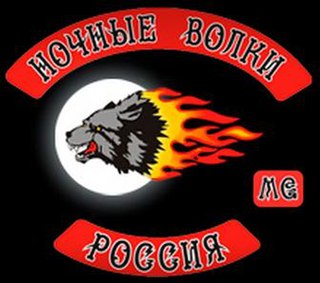
The Night Wolves or Night Wolves Motorcycle Club is a Russian motorcycle club that was founded around the Moscow area in 1989. It holds an international status with at least 45 chapters world-wide.
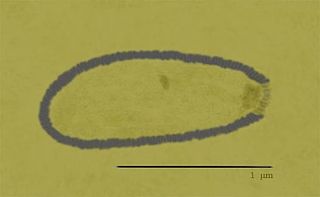
Pithovirus, first described in a 2014 paper, is a genus of giant virus known from two species, Pithovirus sibericum, which infects amoebas and Pithovirus massiliensis. It is a DNA based virus and is a member of the nucleocytoplasmic large DNA viruses clade. The 2014 discovery was made when a viable specimen was found in a 30,000-year-old ice core harvested from permafrost in Siberia, Russia.

Mikhail Viktorovich Popkov is a Russian serial killer, rapist, and necrophile who committed the sexual assault and murder of seventy-eight girls and women between 1992 and 2010 in Angarsk, Irkutsk, in Siberia, and Vladivostok in Far East, although he has confessed to and is suspected of at least eighty-three in total. He is known as "The Werewolf" and the "Angarsk Maniac" for the particularly brutal nature of his crimes; he would extensively mutilate the bodies of his victims and perform sexual acts on them. Popkov was also known as the "Wednesday Murderer" due to bodies of his victims usually being found on Wednesdays. He is the single most prolific serial killer in Russian history.
Panagrolaimus detritophagus is a terrestrial free-living nematode (roundworm). It has been reported in California, South America and Europe. It is the type species of the genus Panagrolaimus. In 2018, it, along with another nematode species became the first multicellular organism to be thawed back into a living state after prolonged cryopreservation. Pleistocene permafrost was obtained from the Kolyma River lowland, and thawed. The worms moved and ate after being thawed. They had been frozen for 30–40 thousand years, based on the age of that deposit.
Plectus parvus is a species of nematode (roundworm) found in freshwater and terrestrial environments. It has been sampled in Europe and New Zealand. Along with the similar nematode Panagrolaimus detritophagus, in 2018 it was the first species of multicellular eukaryote to be thawed into a living state after prolonged cryopreservation. Female worms of this species were found in Pleistocene permafrost in the Kolyma River lowland. They were mobile and ate, after being frozen for 30–40 thousand years.
On 25 October 2019, a Russian soldier shot ten of his colleagues, killing eight of them, in Gorny, Zabaykalsky Krai, Russia. The gunman was later identified as 20-year-old Ramil Shamsutdinov.
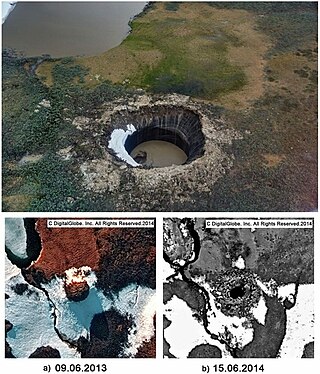
A gas emissions crater or GEC is a crater that is left by an explosion that is believed to be caused by an overheated buildup of gas stuck below a layer of permafrost. The gas is methane and is generally believed by experts to have sept up from large underground reserves toward the Earth's surface "through some kind of geological fault," getting trapped when they reach the bottom of the permafrost. First known to have occurred in 2013, they are occurring solely in Siberia, where there are large stores of natural gas below a melting surface layer of permafrost. They are believed to be a byproduct of global climate change, since the warming of Siberia's climate weakens the permafrost enough to allow a sub-surface methane buildup to cause an outburst. The release of this previously trapped methane into the atmosphere is also likely to increase the speed of global climate change.

From June 2021, the taiga forests in Siberia and the Far East region of Russia were hit by unprecedented wildfires, following record-breaking heat and drought. For the first time in recorded history, wildfire smoke reached the North Pole.
















